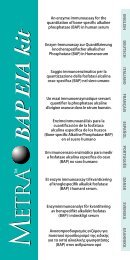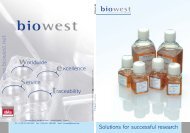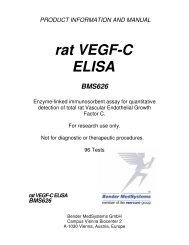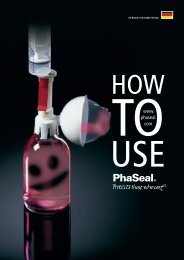You also want an ePaper? Increase the reach of your titles
YUMPU automatically turns print PDFs into web optimized ePapers that Google loves.
Serumfree<br />
<strong>Systems</strong><br />
Serumfree<br />
<strong>Systems</strong><br />
Immunology<br />
Media Sera<br />
Reagents Molecular<br />
Biology<br />
Cytokines/<br />
Growth<br />
Factors<br />
Disposables<br />
for Science/<br />
Services<br />
BIOTECH GmbH
Serumfree Cell Culture <strong>Systems</strong><br />
Cell culture, the cultivation of cells isolated from live tissue in vitro (in the test tube), is an acknowledged<br />
and valuable tool in the biomedical research for the determination of reproducible<br />
data. Apart from that, by means of cell cultures more and more highly effective substances are<br />
produced large-scale for medicine and research (insulin, growth factors, monoclonal antibodies).<br />
The Cell Culture with Serum<br />
Cells in vitro need nutrient solutions, so-called media which guarantee an imitation as exact as<br />
possible of the situation in vivo (in live organism). On the other hand these media – mixtures of<br />
nutrients, salts, trace elements, buffer substances, growth factors, protective substances and<br />
many other components – must be complemented for this purpose by mostly natural, highly complex<br />
additives. Not long ago animal but also human serum were the means to be chosen for reasons<br />
of production technology and also for lack of alternatives.<br />
Function of Serum in the Cell Culture<br />
• Hormone factors stimulate cell growth, proliferation and differentiation<br />
• Attachment factors favour or enable the attachment of the cells to the culture dish (Biomatrix)<br />
• Transport and binding proteins take care among other things of the supply of hormones,<br />
minerals and lipids<br />
• Serum proteins bind toxic substances<br />
This serum, mostly fetal bovine serum (FCS), is problematic for several reasons.<br />
Disadvantages of Serum in the Cell Culture<br />
• The composition of serum is not constant and varies with the age of the foetus, with the<br />
origin and feeding of the animals and with the time of the year.<br />
• Serum batches have to be tested for their suitability before use.<br />
• Test results are often not convincing and often not comparable because of the undefined<br />
and inconstant composition of the serum.<br />
• Risk of a contamination with bacteria, fungi, mycoplasm and virus from serum<br />
• Risk of a contamination with TSE-agents (transmissable spongioform encephalopathy)<br />
• Possibility of a contamination of the end product with serum proteins or pyrogens<br />
• Time-consuming cleaning of the end products from culture media containing serum<br />
• Availability and costs of the serum<br />
The Serumfree Cell Culture<br />
Because of the numerous disadvantages of the cell culture with nutrient media containing serum,<br />
tests have been made for quite some time to establish cell cultures under serumfree conditions.<br />
BIOTECH GmbH<br />
<br />
The company<br />
Am Gewerbepark 13, D-94501 Aidenbach<br />
phone +49 (0) 85 43 - 60 16-30, fax +49 (0) 85 43 - 60 16-49<br />
e-mail: info@pan-biotech.de, http://www.pan-biotech.de<br />
2
Advantages of a Serumfree Cell Culture<br />
• Lower risk with regard to a contamination with bacteria, fungi or virus<br />
• Better defined and reproducible formulations allow more convincing and comparable<br />
research results<br />
• Time-consuming batch tests are not necessary<br />
• Elimination of a source for possible infectious agents (virus, prions)<br />
• Facilitation of the cleaning of the end products<br />
• Fulfilment of legal conditions for the production of medical products<br />
• Reduction of contaminations of the end products by culture residues<br />
Serumfree Culture Media and Serum Substitutes<br />
from PAN-Biotech<br />
In series of tests for many years PAN-Biotech has developed, optimized and successfully<br />
marketed a number of serumfree media for the most different cell types.<br />
The development and optimization of serumfree media takes a lot of time and expenditure.<br />
Several months can often pass until the release of a new product.<br />
With the development of a fully-automatic cell culture system (patent pending) PAN-Biotech<br />
pursues a completely different path. With this system they have succeeded in cultivating different<br />
samples simultaneously under identical conditions and under constant microscopic observation.<br />
By adding individual components res. by changing the concentration, a positive (improvement of<br />
growth) res. negative effect (inhibition of growth) can directly be measured. All relevant data can<br />
be stored and recalled later. Morphologic changes are identified immediately and evaluated<br />
depending on the media composition.<br />
The cell culture system offers many advantages for the development of serumfree media:<br />
• Reduction of the development periods by more convincing results<br />
• Adjusting the optimal concentration of individual substances<br />
• Comparison measurements of competitor products and recording the results<br />
• Culture conditions (temperature, CO2-fumigation) can be changed infinitely variably at any time<br />
• Complete control of individual batches<br />
BIOTECH GmbH<br />
<br />
The company<br />
Am Gewerbepark 13, D-94501 Aidenbach<br />
phone +49 (0) 85 43 - 60 16-30, fax +49 (0) 85 43 - 60 16-49<br />
e-mail: info@pan-biotech.de, http://www.pan-biotech.de<br />
3
Fully-Automatic Cell Culture System from PAN<br />
Incubation chambers with connections<br />
for media and gas supply<br />
CO2-supply<br />
Heating plate<br />
Glass top for microscopic observation<br />
BIOTECH GmbH<br />
<br />
4<br />
Media supply<br />
Digital camera<br />
Incubation chambers<br />
Control heating<br />
CO2-fumigation<br />
Image processing<br />
In the following example, CHO-cells were cultivated in DMEM with 4,5 g/l glucose with<br />
L-glutamine, with pyruvate and different serum substitutes (seed 1 x 10 4 /ml, evaluation 7th day,<br />
cells not adapted).<br />
CHO with serum substitute 1 CHO with serum substitute 2 CHO with 5 % Panexin<br />
Cells do not form any Cells do not form any Cells form uniform<br />
cell layer, loose attachment cell layer, loose attachment cell layer<br />
The company<br />
Am Gewerbepark 13, D-94501 Aidenbach<br />
phone +49 (0) 85 43 - 60 16-30, fax +49 (0) 85 43 - 60 16-49<br />
e-mail: info@pan-biotech.de, http://www.pan-biotech.de
In order to satisfy our customers’ wishes, we will continue to expand and optimize our range of<br />
serum- and proteinfree media.<br />
Beside nutrient solutions ready for use (PANSERIN TM ) we can also offer serum substitutes (PANEXIN)<br />
to our customers which are added in a concentration of 2 % - 8 % instead of the serum to the<br />
respective basic media (e.g. RPMI 1640, DMEM, DMEM/F12).<br />
Serumfree nutrient media without animal or human components res. proteinfree media are also<br />
already available at PAN-Biotech res. in development.<br />
In many cases an adaption of the cells to the serumfree culture is not necessary; with<br />
critical cells (primary cells) the cells are slowly familiarized with the serumfree conditions<br />
with help of our detailed records.<br />
Product Survey<br />
Product: suitable for: Quantity: Cat.-No.: Page:<br />
PANSERIN TM 401 serumfree allround medium 500 ml P04-710401 7-9<br />
Serumfree allround for many cell types 100 ml P04-710401M<br />
medium<br />
PANSERIN TM 411 serumfree allround medium 500 ml P04-710411 7-9<br />
Serumfree allround for cells which also need Insulin 100 ml P04-710411M<br />
medium with Insulin<br />
PANSERIN TM 412 serumfree allround medium 500 ml P04-710412 7-9<br />
Serumfree allround for cells that hardly attach 100 ml P04-710412M<br />
medium with Fetuin<br />
PANSERIN TM 413 serumfree cultivation 500 ml P04-710413 10-11<br />
Growth factors of T-cells<br />
mixture separate<br />
PANSERIN TM 415 serumfree cultivation 500 ml P04-710415 12<br />
of Osteoblasts 100 ml P04-710415M<br />
PANSERIN TM 416 Kit serumfree cultivation 500 ml P04-710416 13-15<br />
Basic medium with of DC (Dendritic Cells) 100 ml P04-710416M<br />
growth factor set<br />
BIOTECH GmbH<br />
<br />
The company<br />
Am Gewerbepark 13, D-94501 Aidenbach<br />
phone +49 (0) 85 43 - 60 16-30, fax +49 (0) 85 43 - 60 16-49<br />
e-mail: info@pan-biotech.de, http://www.pan-biotech.de<br />
5
Product Survey<br />
Product: suitable for: Quantity: Cat.-No.: Page:<br />
PANSERIN TM 604ST serumfree medium for CHO- 500 ml P04-604ST 16-18<br />
cells in suspension culture<br />
PANSERIN TM 604S serumfree medium for CHO- 500 ml P04-604S 16-18<br />
cells in suspension culture.<br />
Medium doesn’t contain any<br />
components of human or<br />
animal origin<br />
PANSERIN TM 604SPF proteinfree medium for CHO- 500 ml P04-604SPF 16-18<br />
cells in suspension culture –<br />
Medium with chemically<br />
defined substances<br />
PANSERIN TM 604 serumfree medium for CHO- 500 ml P04-710604 16-18<br />
cells in adherent culture 100 ml P04-710604M<br />
PANSERIN TM PX10 serumfree medium for 500 ml P04-710PX10 19-21<br />
myeloma cells, production 100 ml P04-710PX10M<br />
of monoclonal Antibodies<br />
PANEXIN many adherent and non- 100 ml P04-95100 22-23<br />
adherent cells – serum substitute 10 ml P04-95010<br />
PANEXIN H many adherent and non- 100 ml P04-95300 22-23<br />
adherent cells – serum substitute 10 ml P04-95030<br />
without animal components<br />
PANEXIN D adherent cells that hardly 100 ml P04-95200 22-23<br />
attach – serum substitute with 10 ml P04-95020<br />
additional attachment factors<br />
PANEXIN S many adherent and non- 100 ml P04-95400 22-23<br />
(in development) adherent cells – serum substitute 10 ml P04-95040<br />
without animal or human<br />
components<br />
BIOTECH GmbH<br />
<br />
The company<br />
Am Gewerbepark 13, D-94501 Aidenbach<br />
phone +49 (0) 85 43 - 60 16-30, fax +49 (0) 85 43 - 60 16-49<br />
e-mail: info@pan-biotech.de, http://www.pan-biotech.de<br />
6
PANSERIN TM 401<br />
PANSERIN TM 401 is a complete medium ready for use for the serumfree cultivation of a multitude<br />
of cells. Among others the following cells have been cultivated successfully:<br />
• Hybridoma<br />
• Lymphocytes<br />
• Macrophages<br />
• Fibroblasts<br />
• Melanocytes<br />
• Carcinome cells<br />
• HEK-cells<br />
• HeLa-Zellen<br />
• CHO-cells<br />
Composition:<br />
Based on Iscove’s MEM, trace elements, albumin, cholesterol, soya lipids and vitamins were added<br />
to the medium. It does not contain any growth or attachment factors or any insulin.<br />
Application:<br />
For many cells (SP2, HEK, L929, CHO) a slow adaption to PANSERIN TM 401 is not necessary.<br />
They are adapted to the serumfree culture according to the<br />
Direct Adaption Method.<br />
• Transfer sound cells (> 90 % Vitality) of the logarithimic growth phase from the culture containing<br />
serum directly into PANSERIN TM 401. A higher cell seed (5 x 10 4 - 1 x 10 5 ) facilitates the adaption<br />
to the serumfree culture.<br />
• After 36 - 48 hours in the culture, replace medium by fresh PANSERIN TM 401.<br />
• As soon as the cells have confluently grown at 90 % to 100 %, passage the cells with the usual<br />
trypsinating technique. You have to be aware that cells in the serumfree culture show an<br />
extremeley sensitive reaction on trypsin. Normal trypsin concentrations (0,25 %) can be used,<br />
however the incubation period should be as short as possible at 4 °C. The trypsin can be<br />
removed by washing the cells and centrifugation. Soybean-trypsin-inhibitor has to be used with<br />
caution as it is toxic for some cells.<br />
• After several passages into PANSERIN TM 401 the adaption is completed.<br />
Critical cells can be adapted to the serumfree culture according to the<br />
Gradual Adaption Method.<br />
• Transfer sound cells (> 90 % Vitality) of the logarithmic growth phase from the culture containing<br />
serum (10 % - 20 % FCS) directly into PANSERIN TM 401. Reduce serum contents to 5 %. The<br />
usual seeding densities can be kept, but with very critical cells increase seeding densities<br />
by 1,5 to 2 x.<br />
• After 2 passages with 5 % FCS supplementation, reduce FCS contents to 1 %.<br />
• After 2 - 3 passages with 1% FCS, reduce serum contents to 0,5 %.<br />
• After further 2 - 3 passages with 0,5 % FCS, cultivate cells without addition of FCS<br />
in PANSERIN TM 401.<br />
BIOTECH GmbH<br />
<br />
The company<br />
Am Gewerbepark 13, D-94501 Aidenbach<br />
phone +49 (0) 85 43 - 60 16-30, fax +49 (0) 85 43 - 60 16-49<br />
e-mail: info@pan-biotech.de, http://www.pan-biotech.de<br />
7
PANSERIN TM 401 does not contain any attachment factors. With some cell types a pretreatment<br />
of the incubation dishes with gelatin, collagen, poly-D-lysine or fibronectin can considerably facilitate<br />
the culture under serumfree conditions or even enable it.<br />
Please note this above all for low seeding densities.<br />
Additional growth factors are necessary for some cells and have to be added depending on the<br />
demand. Please note another important point:<br />
With every adaption to serumfree media, changes of the cells should be taken into consideration.<br />
These changes can concern the morphology, the karyotype, the surface marker etc. Thus cells in<br />
serumfree medium don’t always have to be identical with those from the culture containing serum<br />
in which they originate (selection).<br />
SP2/0-Ag-14 in PANSERIN TM 401<br />
Cells were cultivated in<br />
PANSERIN TM 401 without adaption<br />
BIOTECH GmbH<br />
<br />
The company<br />
L 929 in PANSERIN TM 401<br />
Cells were cultivated in<br />
PANSERIN TM 401 without adaption phase.<br />
8<br />
Typical growth curve L929<br />
in PANSERIN TM 401:<br />
Am Gewerbepark 13, D-94501 Aidenbach<br />
phone +49 (0) 85 43 - 60 16-30, fax +49 (0) 85 43 - 60 16-49<br />
e-mail: info@pan-biotech.de, http://www.pan-biotech.de<br />
L929 were cultivated in<br />
PANSERIN TM 401<br />
without adaption phase<br />
As a comparison L929 in DMEM<br />
with 4,5 g/l glucose with 10 % FBS
Order Information:<br />
BIOTECH GmbH<br />
<br />
9<br />
Typical growth curve<br />
SP2/0-Ag-14<br />
in PANSERIN TM 401:<br />
SP2/0-Ag-14 cells were<br />
cultivated in PANSERIN TM 401<br />
without adaption phase<br />
As a comparison cell growth<br />
in RPMI 1640 with 10 % FBS<br />
Product: suitable for: Quantity: Cat.-No.:<br />
PANSERIN TM 401 serumfree allround medium 500 ml P04-710401<br />
Serumfree allround for many cell types 100 ml P04-710401M<br />
medium<br />
PANSERIN TM 411 serumfree allround medium 500 ml P04-710411<br />
Serumfree allround for cells which also need Insulin 100 ml P04-710411M<br />
medium with Insulin<br />
PANSERIN TM 412 serumfree allround medium 500 ml P04-710412<br />
Serumfree allround for cells that hardly attach 100 ml P04-710412M<br />
medium with Fetuin<br />
The company<br />
Am Gewerbepark 13, D-94501 Aidenbach<br />
phone +49 (0) 85 43 - 60 16-30, fax +49 (0) 85 43 - 60 16-49<br />
e-mail: info@pan-biotech.de, http://www.pan-biotech.de
PANSERIN TM 413<br />
PANSERIN TM 413 is a medium ready for use for the cultivation of lymphocytes (from full blood).<br />
There is a multitude of questions with the subject matter of short-term cultivation of human cells.<br />
As human full blood is relatively easily accessible and because of the possibility of preparing<br />
peripheral lymphocyte cultures for a short time, quite a lot of methods have been developed in<br />
order to keep blood cells and especially lymphocytes in culture. In principle blood cells in the culture<br />
die relatively soon, only lymphocytes can be kept in culture over several cell divisions. However,<br />
in order to reach a division of the cells which are normally not proliferating, the cells must be stimulated<br />
with specific mitogens. These mitogens are mostly plant lectines (phytohaemagglutinin, PHA).<br />
Composition:<br />
Based on Iscove’s MEM, trace elements, albumin, cholesterol, soya-lipids and vitamins were<br />
added to the medium. A growth factor mixture is also supplied which has to be added to the medium<br />
shortly before the cultivation.<br />
Application:<br />
1. Isolation of lymphocytes from full blood by means of density gradient centrifugation<br />
• Mix heparinised blood 1: 1 with PBS and add it into a centrifuge tube which has been filled with<br />
lymphocyte separating medium (Pancol density 1,077 g/ml) before: pipette carefully in order<br />
to avoid a phase mixture!<br />
• Centrifuge the gradient at 400 x g for 30 minutes at ambient temperature (brake of the centrifuge<br />
set on “off”); 4 phases are created<br />
– top phase plasma<br />
– opaque whitish bands (lymphocytes)<br />
– separating medium<br />
– pellet with erythrocytes and granulocytes<br />
• Suck off the plasma with a pipette and transfer the lymphocytes with another pipette into a new<br />
centrifuge glass.<br />
• Wash the lymphocytes with PBS (without Ca, Mg) and centrifuge them at 100 x g for 10 minutes.<br />
Repeat washing step.<br />
2. Cultivation and stimulation of the lymphocytes<br />
• Resuspend lymphocytes in PANSERIN TM 413.<br />
• For the stimulation of the lymphocyte proliferation adjust the cells to a cell density of approx.<br />
1x10 5 and add phytohaemagglutinin in a concentration of 1-5mg/ml; the incubation time is<br />
48 to 72 hours, depending on the kind and origin of the lymphocytes and depending on the<br />
further use.<br />
• Further cultivation in PANSERIN TM 413. After approx. 14 days a restimulation is necessary.<br />
BIOTECH GmbH<br />
<br />
The company<br />
Am Gewerbepark 13, D-94501 Aidenbach<br />
phone +49 (0) 85 43 - 60 16-30, fax +49 (0) 85 43 - 60 16-49<br />
e-mail: info@pan-biotech.de, http://www.pan-biotech.de<br />
10
Order Information:<br />
Product: suitable for: Quantity: Cat.-No.:<br />
PANSERIN TM 413 serumfree cultivation 500 ml P04-710413<br />
Growth factors of T-cells<br />
mixture separate<br />
BIOTECH GmbH<br />
<br />
The company<br />
Am Gewerbepark 13, D-94501 Aidenbach<br />
phone +49 (0) 85 43 - 60 16-30, fax +49 (0) 85 43 - 60 16-49<br />
e-mail: info@pan-biotech.de, http://www.pan-biotech.de<br />
11
PANSERIN TM 415<br />
PANSERIN TM 415 is a complete medium ready for use for the cultivation of osteoblasts.<br />
These osteoblasts are of mesenchymal origin as they are bone-building cells.<br />
They lie almost always next to each other epithelium-like in a layer and have contact to each<br />
other via short delicate appendices.<br />
The osteoblasts produce the intercellular substance<br />
of the bone tissue, which consists of basic substance<br />
and collagen fibres (type I).<br />
Because of the matrix production continuing during<br />
the bone development and the bone growth, the<br />
osteoblasts, which have first been close neighbours,<br />
drift apart more and more. Thus the conditions for the<br />
metabolism and the matrix production get increasingly<br />
worse which is finally stopped completely.<br />
The conversion into osteocytes takes place.<br />
Composition:<br />
PANSERIN TM 415 consists of nutrient-rich basal medium to which lipids, albumin, transferrin, insulin<br />
and trace elements have been added for an optimal growth of osteoblasts.<br />
Order Information:<br />
BIOTECH GmbH<br />
<br />
12<br />
Osteoblasts in PANSERIN TM 415<br />
Osteoblasts were cultivated without<br />
adaption from a culture containing<br />
serum directly in PANSERIN TM 415.<br />
As a comparison the growth in DMEM<br />
with 4,5 g/l glucose with L-glutamine,<br />
pyruvate and 10 % FBS<br />
Product: suitable for: Quantity: Cat.-No.:<br />
PANSERIN TM 415 serumfree cultivation 500 ml P04-710415<br />
of Osteoblasts 100 ml P04-710415M<br />
The company<br />
Am Gewerbepark 13, D-94501 Aidenbach<br />
phone +49 (0) 85 43 - 60 16-30, fax +49 (0) 85 43 - 60 16-49<br />
e-mail: info@pan-biotech.de, http://www.pan-biotech.de
PANSERIN TM 416<br />
PANSERIN TM 416 is a serumfree medium (basic medium) which is, after supplementation of growth<br />
factors, suitable for the production of dendritic cells.<br />
Dendritic cells are highly specialized antigen-presenting cells and can initiate and regulate antigenspecific<br />
immunoresponses. This ability can be used in order to generate immunoresponses against<br />
certain proteins of tumour cells and thus to fight against tumours with the immune system. Dendritic<br />
cells have been isolated from a great variety of non-lymphatic and lymphatic tissue of human<br />
beings, mice and other species.<br />
For the generation of tumour vaccines, dendritic cells can be produced from the peripheral blood<br />
of tumour patients. In clinical studies the principal effectiveness of a vaccination with dendritic<br />
cells has been shown.<br />
Antigen Uptake:<br />
In almost any tissue of the body, dendritic cells form a dense network of guardian cells that take<br />
up extracellular components by processes such as phagocytosis and endocytosis and thus analyse<br />
their environment. Proteins that have been taken up undergo an intracellular decomposition into<br />
peptides, are bound to MHC-molecules and transported to the cell surface. Thus antigenic<br />
determinants of the peptides are made recognizable to T-cells. Within the scope of the physiological<br />
cell regeneration dendritic cells leave the peripheral tissue and migrate with the lymph into a<br />
regional lymph node where they interact with T-cells. From an intact tissue dendritic cells reach<br />
the lymph node in unactivated condition.<br />
A functioning monitoring system excels in the ability to quickly and specifically recognize damaging<br />
processes and to take suitable steps against them. For this purpose, dendritic cells carry receptors<br />
on their surface for a variety of danger signals which can be radiated from microorganisms,<br />
mediators inherent in the body or activated T-cells. Examples for microbial structures activating<br />
dendritic cells are lipopolysaccharides of Gram-negative bacteria, cytidine guanosine dinucleotide<br />
(cpG) – rich bacterial DNA and viral doublestranded RNA. Endogenous mediators, for which dendritic<br />
cells have special receptors and which send an activating signal, are cytokines, prostanoids and<br />
adenine nucleotides. Activated T-cells can stimulate dendritic cells by means of the CD40-ligand<br />
integrated in their cell membrane. The activation of these different receptors induces essential<br />
cell changes which are summarized by the term maturation. The ability of phagocytosis gets lost.<br />
Peptides bound to MHC-molecules are presented in a higher density and with greater stability. The<br />
cytoskeleton structure is reorganized and a changed expression of chemokine receptors enables<br />
the dendritic cells to get from the focus of inflammation into the draining lymph node. Co-stimulating<br />
molecules on the surface of dendritic cells and the release of cytokines, e.g. interleukin-12, finally<br />
allow the dendritic cells an efficient interaction with T-cells.<br />
Induction of an Immunoresponse:<br />
In the lymph node, dendritic cells interact with various lymphocyte populations. Above all T-cells,<br />
which haven’t yed had any antigen contact, feel the cell surface of dendritic cells and are activated<br />
if the T-cell receptor recognizes the presented antigen. This central process for the acquired (antigenspecific)<br />
immunoresponse is called “Priming”. Cytotoxic T-cells develop from CD8 cells and these<br />
cytotoxic T-cells are able to kill those cells which they recognize with their T-cell receptor.<br />
BIOTECH GmbH<br />
<br />
The company<br />
Am Gewerbepark 13, D-94501 Aidenbach<br />
phone +49 (0) 85 43 - 60 16-30, fax +49 (0) 85 43 - 60 16-49<br />
e-mail: info@pan-biotech.de, http://www.pan-biotech.de<br />
13
Tumour Vaccination with Dendritic Cells:<br />
Tumour cells express specific proteins which can be recognized as antigenic determinants by<br />
T-cells. As a rule, however, this is not sufficient for the immune system to generate an effective<br />
immunoresponse against tumour cells; there is rather a tolerance. On the one hand this is because<br />
tumour-associated antigens are often also found in sound tissue in a low density; on the other<br />
hand tumour cells have numerous strategies to escape an immunoresponse. In a number of animal<br />
experiments, however, it could be clearly shown that this tolerance for tumours can be broken by<br />
a vaccination with dendritic cells.<br />
Generation of Dendritic Cells:<br />
Dendritic cells are derived from hematopoetic precursor cells in the bone marrow. Three different<br />
subpopulations with each characteristic features and functions are described for the human being:<br />
myeloid dendritic cells, plasmacytoid and Langerhans cells of the skin. For tumour vaccinations,<br />
myeloid dendritic cells are mainly of interest as they are especially capable of taking up and<br />
presenting antigens. Dendritic cells with myeloid characteristics can be produced by an in vitro<br />
culture of monocytes in the presence of the cytokines interleukin-4 (IL-4) and granulocytesmacrophages<br />
colony-stimulating factor (GM-CSF). Alternatively dendritic cells can be generated<br />
from CD34+ hematopoetic stem cells of the peripheral blood.<br />
By the addition of growth factors, e.g. Klt3-ligand, dendritic cells in the blood, which normally make<br />
up only approx. 0,1 - 0,5 % of the mononuclear cells, can be expanded many times over.<br />
After activation, dendritic cells reach their full capacity for the T-cell stimulation. For the maturation<br />
of the dendritic cells, cytokines (TNF alpha), LPS or monocyte-conditioned medium are used.<br />
Production and serumfree cultivation of dendritic cells from mononuclear cells<br />
of peripheral blood (PBMC)<br />
PAN-Biotech has developed an optimised medium for the serumfree cultivation of dendritic cells.<br />
PANSERIN TM 416 (basic medium) is supplemented by the growth factors delivered with it and thus<br />
allows the serumfree cultivation of dendritic cells.<br />
Separation of Blood with Separating Medium (Pancoll 1,077 g/ml)<br />
The blood samples should be processed as soon as possible after production in order to<br />
achieve optimal results. A storage of the blood samples for 24 hours at ambient<br />
temperature causes among other things a reduced output of lymphocytes, a change of<br />
the surface markers and a reduced response on mitogen stimulation.<br />
1) Add Pancoll (3 ml) into a suitable, sterile centrifuge tube under sterile conditions.<br />
2) Carefully coat the separating medium with the diluted blood sample (4 ml). Important: Don’t mix the blood sample with Pancoll!<br />
3) Centrifugation at 400 x g for 30 - 40 minutes at 18 - 20 °C.<br />
4) After the centrifugation, carefully take off the upper phase (containing serum and platelets) with a pipette without mixing the<br />
interphase with the lymphocytes.<br />
5) Transfer the lymphocyte band into a new centrifuge tube with a new pipette. Here it is important to take off the whole material<br />
of the interphase with as little volume as possible.<br />
6) Add at least 3 volumes of a physiological saline solution (6 ml) to the lymphocytes.<br />
7) Carefully suspend the lymphocytes with a pipette.<br />
8) Centrifugation at 60 - 100 x g for 10 minutes at 18 -20 °C.<br />
9) Reject the supernatant.<br />
10) Repeat washing step (point 6 - 9).<br />
BIOTECH GmbH<br />
<br />
The company<br />
Am Gewerbepark 13, D-94501 Aidenbach<br />
phone +49 (0) 85 43 - 60 16-30, fax +49 (0) 85 43 - 60 16-49<br />
e-mail: info@pan-biotech.de, http://www.pan-biotech.de<br />
14
Serumfree Cultivation of Dentritic Cells in PANSERIN TM 416<br />
After the last washing step the mononuclear cells are transferred with a cell density of 1 x 10 7<br />
cells/ml into PANSERIN TM 416. In order to remove non-adherent cells, the culture dishes are put<br />
into the incubator for 2 hours. Then the supernatant is carefully taken off and replaced by new<br />
PANSERIN TM 416. GM-CSF (10 ng/ml) and interleukin-4 (10 ng/ml) are added as growth factors.<br />
The culture dishes are incubated for further 6 days in the incubator and every day half of the<br />
medium is replaced by new medium which is supplemented by GM-CSF and IL-4.<br />
Maturation of Dentritic Cells<br />
The dendritic cells are suspended with a density of 10 6 cells/ml in PANSERIN TM 416 with GM-CSF<br />
and IL-4. For the maturation of the cells, 50 ng/ml LPS or TNFalpha (20 ng/ml) are added.<br />
The cells can be harvested after approx. 3 days.<br />
Dendritic cells in PANSERIN TM 416<br />
with GM-CSF and IL-4 (6th day)<br />
Order Information:<br />
BIOTECH GmbH<br />
<br />
Dendritic cells in RPMI<br />
with 10 % FCS, GM-CSF and IL-4 (6th day)<br />
Product: suitable for: Quantity: Cat.-No.:<br />
PANSERIN TM 416 Kit serumfree cultivation 500 ml P04-710416<br />
Basic medium with of DC (Dendritic Cells) 100 ml P04-710416M<br />
growth factor set<br />
The company<br />
Am Gewerbepark 13, D-94501 Aidenbach<br />
phone +49 (0) 85 43 - 60 16-30, fax +49 (0) 85 43 - 60 16-49<br />
e-mail: info@pan-biotech.de, http://www.pan-biotech.de<br />
15
PANSERIN TM 604<br />
PANSERIN TM 604 is a complete medium ready for use for the cultivation of transfected and<br />
non-transfacted CHO-cells (Chinese Hamster Ovary).<br />
These cells are frequently used for the production of recombinant proteins. The cells normally grow<br />
adherently (e.g. in roller cultures), however with suitable media and with the optimal media they<br />
can also be kept in suspension culture (continuous perfusion or batch systems).<br />
PAN-Biotech has developed an optimal version for every application:<br />
For the suspension culture:<br />
• PANSERIN TM 604ST serumfree – optimal cell growth, quick adaption<br />
• PANSERIN TM 604S without protein or peptide components of animal or human origin<br />
• PANSERIN TM 604SPF chemically defined, proteinfree<br />
The following graph shows the growth curves of the PANSERIN TM 604 versions.<br />
The CHO-cells were cultivated from an adherent culture containing serum in PANSERIN TM 604<br />
without a preceding adaption. The seed amounted to 50 000 cells/ml. The maximum generation<br />
times were 15,3 to 18,5 hours.<br />
Composition:<br />
PANSERIN TM 604 serumfree:<br />
A basal medium optimized for suspension cultures, which had been designed for a high cell density,<br />
was supplemented with hormons, lipids and special growth factors for an optimal growth of CHOcells.<br />
It does not contain any undefined lysates or plant hydrolysates. It allows a very quick growth<br />
of the cells without long adaption phases.<br />
BIOTECH GmbH<br />
<br />
The company<br />
Am Gewerbepark 13, D-94501 Aidenbach<br />
phone +49 (0) 85 43 - 60 16-30, fax +49 (0) 85 43 - 60 16-49<br />
e-mail: info@pan-biotech.de, http://www.pan-biotech.de<br />
16
PANSERIN TM 604S without animal or human components<br />
Basal medium which has been completed with exclusively recombinant proteins. It does not contain<br />
any undefined lysates or plant hydrolysates. Especially suitably for the production of proteins which<br />
are applied in sensitive fields. It excels by a quick cell growth without long adaption phases.<br />
PANSERIN TM 604SPF proteinfree, chemically defined:<br />
This medium is completely proteinfree and chemically defined. After a short adaption phase excellent<br />
growth rates can be reached with this medium and these growth rates are only slightly under the<br />
culture media containing protein and serum. Especially suitable for the production of recombinant<br />
proteins for the application in sensitive fields.<br />
BIOTECH GmbH<br />
<br />
CHO-Zellen in PANSERIN TM 604ST, serumfree<br />
CHO-Cells were cultivated directly without adaption<br />
phase from an adherent culture containing serum<br />
in a suspension culture with PANSERIN TM 604<br />
(shaking culture).<br />
Because of an optimal and well-balanced composition of the medium an aggregate formation of<br />
the cells, as it can be seen with many serumfree media, could be largely avoided (see illustration).<br />
For the adherent culture:<br />
PANSERIN TM 604 supports the growth of adherent CHO-cells in an optimal way. With attachment<br />
factors the cells can grow on quickly and this allows a high cell output within a short time.<br />
Composition:<br />
CHO-Cells in PANSERIN TM 604<br />
CHO-Cells were transferred from<br />
a culture containing serum directly<br />
into PANSERIN TM 604.<br />
A basal medium optimized for CHO-cells was supplemented with albumin, insulin, transferrin,<br />
attachment factors, growth factors, lipoproteins and trace elements. It does not contain any<br />
undefined hydrolysates or lysates.<br />
The company<br />
Am Gewerbepark 13, D-94501 Aidenbach<br />
phone +49 (0) 85 43 - 60 16-30, fax +49 (0) 85 43 - 60 16-49<br />
e-mail: info@pan-biotech.de, http://www.pan-biotech.de<br />
17
CHO-Cells were cultivated from a culture containing serum in PANSERIN TM 604 without adaption.<br />
As a comparison CHO-cells in DMEM with 4,5 g/l glucose, L-glutamine and pyruvate, supplemented<br />
with 10 % FBS.<br />
Order Information:<br />
Product: suitable for: Quantity: Cat.-No.:<br />
For the suspension culture<br />
PANSERINTM 604ST serumfree medium for CHOcells<br />
in suspension culture<br />
500 ml P04-604ST<br />
PANSERIN TM 604S serumfree medium for CHO- 500 ml P04-604S<br />
cells in suspension culture.<br />
Medium doesn’t contain any<br />
components of human or<br />
animal origin<br />
PANSERIN TM 604SPF proteinfree medium for CHO- 500 ml P04-604SPF<br />
cells in suspension culture –<br />
Medium with chemically<br />
defined substances<br />
For the adherent culture<br />
PANSERIN TM 604 serumfree medium for CHO- 500 ml P04-710604<br />
cells in adherent culture 100 ml P04-710604M<br />
BIOTECH GmbH<br />
<br />
The company<br />
Am Gewerbepark 13, D-94501 Aidenbach<br />
phone +49 (0) 85 43 - 60 16-30, fax +49 (0) 85 43 - 60 16-49<br />
e-mail: info@pan-biotech.de, http://www.pan-biotech.de<br />
18
PANSERIN TM PX10<br />
PANSERIN TM PX10 is a serumfree medium ready for use for the production of monoclonal<br />
antibodies. Due to the optimised composition the cells are stimulated to proliferationeven with<br />
low seed densities.<br />
SP2/0-Ag-14 in PANSERIN TM PX10 SP2/0-Ag-14 in RPMI 1640 with 10 % FCS<br />
SP2/0-Ag-14 have been transferred from a culture containing serum (10 % FCS in RPMI 1640)<br />
directly into PANSERIN TM PX10 and cultivated in the incubator at 37 °C and with 5 % CO2-fumigation<br />
for 5 days.<br />
Seed 1000 cells/ml. The cells grow very well without a long adaption phase, comparable<br />
to a culture containing serum (picture on the right).<br />
PANSERIN TM PX10 distinguishes itself, beside the excellent growth-stimulating properties, by its<br />
cloning capacity. Conventional serumfree systems often need lengthy and timeconsuming adaption<br />
steps and cell seeds up to 10 5 cells/ml.<br />
By contrast, most clones can be directly transferred into PANSERIN TM PX10. With PANSERIN TM PX10,<br />
clones can even be produced without great difficulties.<br />
Cloning of SP2/0-Ag-14<br />
in PANSERIN TM PX10<br />
Composition:<br />
BIOTECH GmbH<br />
<br />
Cloning of SP2/0-Ag-14<br />
in RPMI 1640 with 20 % FCS<br />
PANSERIN TM PX10 contains cleaned proteins, lipids, salts, amino acids, trace elements and hormones<br />
in an optimised prescription. It doesn’t contain any undefined hydrolysates or lysates (e.g.<br />
peptones). L-glutamine is already included in the medium. Antibiotic is not included in the formulation.<br />
The company<br />
Am Gewerbepark 13, D-94501 Aidenbach<br />
phone +49 (0) 85 43 - 60 16-30, fax +49 (0) 85 43 - 60 16-49<br />
e-mail: info@pan-biotech.de, http://www.pan-biotech.de<br />
19
spleen<br />
hybrid cells<br />
Immunization<br />
BIOTECH GmbH<br />
cell fusion<br />
Production of cell clones<br />
analysis of the antibody production<br />
cell culture<br />
production of<br />
monoclonal<br />
antibodies<br />
with<br />
Myeloma cells<br />
PANSERIN TM PX10<br />
<br />
analysis<br />
of the<br />
antibodies<br />
Production and cleaning of the monoclonal antibodies<br />
20<br />
Monoclonal Antibodies<br />
Antibodies are proteins specifically<br />
binding to structures res.<br />
substances which are called<br />
angines. They are part of the<br />
defense mechanisms of the<br />
immune system and are produced<br />
by the leucocytes (B-lymphocytes)<br />
as a reaction on the respective<br />
specific antigen.<br />
The human humoral immune<br />
system is able to produce a<br />
tremendous number of antibodies<br />
(approx. 10 8 ) with different<br />
antigen binding specificity.<br />
They serve to identify foreign body<br />
antigens (bacteria, virus).<br />
This diversity is brought about by<br />
a relatively small gene repertoire<br />
and a recombination of V-, J- and<br />
D-sequences takes effect on the<br />
variety of antibodies of the<br />
variable regions.<br />
The work of Köhler and Milstein<br />
set a landmark for the production<br />
of monoclonal antibodies. The<br />
conventional way of production<br />
used to bring about only polyclonal<br />
antibodies in small quantities but<br />
the specificity and presentable<br />
quantitiy for experimental work<br />
were made possible only by the<br />
hybridisation of cells (not<br />
indefinitely divisible, e.g. spleen<br />
cells) from immunized animals<br />
and the indefinitely divisible<br />
myeloma cells.<br />
Such hybrid cells can be multiplied<br />
further on in the culture and then<br />
they produce a clone (offspring<br />
of identical cells) by which monoclonal<br />
antibodies are produced.<br />
The field of application and the distribution of monoclonal antibodies reach from a therapeutical<br />
application (fight against cancer) to diagnostic applications (ELISA) and are still increasing.<br />
The company<br />
Am Gewerbepark 13, D-94501 Aidenbach<br />
phone +49 (0) 85 43 - 60 16-30, fax +49 (0) 85 43 - 60 16-49<br />
e-mail: info@pan-biotech.de, http://www.pan-biotech.de
Application:<br />
In many cases a serum-free cultivation can be carried out without time-consuming adaption steps.<br />
With critical clones, reduce the serum slowly (see instruction PANSERIN TM 401).<br />
• Warm up PANSERIN TM PX10 to 37 °C.<br />
• Transfer hybridoma directly into PANSERIN TM PX10. In most cases a cell number of 1000 cells/ml<br />
is sufficient.<br />
• Incubate the cells in the usual way in the CO2-incubator at 37 °C (5 % CO2-fumigation) res. multiply<br />
them in the bioreactor.<br />
• Extract monoclonal antibodies from the supernatant.<br />
Order Information<br />
Product: suitable for: Quantity: Cat.-No.:<br />
PANSERIN TM PX10 serumfree medium for 500 ml P04-710PX10<br />
myeloma cells, production 100 ml P04-710PX10M<br />
of monoclonal Antibodies<br />
BIOTECH GmbH<br />
<br />
The company<br />
Am Gewerbepark 13, D-94501 Aidenbach<br />
phone +49 (0) 85 43 - 60 16-30, fax +49 (0) 85 43 - 60 16-49<br />
e-mail: info@pan-biotech.de, http://www.pan-biotech.de<br />
21<br />
Typical growth curve<br />
of SP2/0-Ag-14<br />
in PANSERIN TM PX10<br />
Sp2/0-Ag-14 cells have been<br />
transferred from a culture<br />
containing serum (RPMI 1640<br />
with 10 % FCS) directly into<br />
PANSERIN TM PX10.<br />
Seed 1000 Zellen/ml. As a<br />
comparison Sp2/0-Ag-14<br />
in RPMI 1640 with 10 % FCS.<br />
SP2/0-Ag-14 cells were<br />
used from a culture<br />
containing serum directly<br />
in a cloning efficiency test<br />
with PANSERIN TM PX10<br />
The absolute cloning efficiency<br />
was 75 % (77 % with 20 % FCS)<br />
the relative cloning efficiency<br />
97 % (100 % with 20 % FCS)
PANEXIN<br />
PANEXIN is a chemically defined serum substitute for the cultivation of adherent and nonadherent<br />
cells under serumfree conditions. The sterile solution ready for use is added in an end concentration<br />
of 2 % to 8 % (dependant on the cells) to the culture medium. It supports the growth of many cell<br />
types in an optimal way.<br />
Composition:<br />
PANEXIN contains cleaned protein, lipids, salts, amino acids, trace elements, attachment factors<br />
and hormones in an optimized recipe. It does not contain any undefined hydrolysates or lysates<br />
(e.g. peptone).<br />
PANEXIN H does not contain any components of animal origin. A version, which contains neither<br />
animal nor human components, is at the development stage at the moment.<br />
Application:<br />
In many cases a serumfree cultivation can be carried out without time-consuming adaption steps<br />
(many permanent cell-lines e.g. SP2, HEK, CHO, L929).<br />
• Defrost PANEXIN slowly in the water bath.<br />
• Trypsinate adherent cells in the usual way (e.g. 0,25 % trypsin solution). As soon as the cells<br />
have rounded and separated from the surface (the process can be accelerated at 37 °C),<br />
inactivate with FCS trypsin.<br />
• Add the cells to PBS (without Mg and Ca) and centrifuge. Take off supernatent sterile and reject<br />
it. Resuspend cells in basic medium (RPMI 1640, DMEM or others) and determine cell number.<br />
• To the usual basic medium (e.g. RPMI 1640, DMEM, MEM, DMEM/F12) add 5 % PANEXIN sterile.<br />
• Add cell suspension with 5000 - 50000 cells/ml to the basic medium supplemented with PANEXIN.<br />
• Incubate the cells in the usual way in the CO2-incubator at 37 °C.<br />
• Non-adherent cells (e.g. SP2) can be directly transferred into the nutrient solution (e.g. RPMI<br />
1640, IMDM) supplemented with 5 % PANEXIN.<br />
Depending on the cell type, the optimal PANEXIN concentration can vary between 2 % and 8 %. This<br />
must be determined individually for each cell type. The tests should be started with 5 % PANEXIN<br />
concentration as with this concentration the best results have been reached with most cells. Higher<br />
concentrations (> 10 % PANEXIN) are already toxic for many cells and should not be used.<br />
As basic medium you can use the classical standard media like RPMI 1640, DMEM (high or low<br />
glucose), DMEM/F12, IMDM and so on. u.s.w. Pay attention that L-glutamine is available in a<br />
sufficient quantity (maybe more has to be added). Also here, depending on the cell type, differences<br />
with the different standard media can be seen. We have achieved the best results with RPMI 1640<br />
and IMDM for non-adherent cells and with DMEM and DMEM/F12 for adherent cells, in combination<br />
with 5% PANEXIN.<br />
For critical cells (e.g. primary cells) an adaption to PANEXIN is necessary.<br />
Adaption Instructions for PANEXIN<br />
Condition for a successful adaption are vital cells (exclusion trypan blue) which should be harvested<br />
in the logarithmic growth phase.<br />
BIOTECH GmbH<br />
<br />
The company<br />
Am Gewerbepark 13, D-94501 Aidenbach<br />
phone +49 (0) 85 43 - 60 16-30, fax +49 (0) 85 43 - 60 16-49<br />
e-mail: info@pan-biotech.de, http://www.pan-biotech.de<br />
22
• Harvest cells in the usual way.<br />
• Add 5 % PANEXIN to the usual basic medium (the ready solution is stable at 4°C<br />
for at least 4 weeks) = MedPAN<br />
• Add 10 % FBS to the basic medium = MedFBS<br />
1. 75 % MedFBS : 25 % MedPAN<br />
Seed 5 x 10 4 – 1x10 5 cells/ml • Observe cells under the microscope, passage at 90 % confluence cells – 2 - 3 passages<br />
when the cells grow well convert into<br />
2. 50 % MedFBS : 50 % MedPAN<br />
Seed 5 x 10 4 – 1x10 5 cells/ml • Observe cells under the microscope, passage at 90 % confluence cells – 2 - 3 passages<br />
when the cells grow well convert into<br />
3. 25 % MedFBS : 75 % MedPAN<br />
Seed 5 x 10 4 – 1x10 5 cells/ml • Observe cells under the microscope, passage at 90 % confluence cells – 2 - 3 passages<br />
when the cells grow well convert into<br />
4. 100 % MedPAN<br />
Seed 5 x 10 4 – 1x10 5 cells/ml • Observe cells under the microscope<br />
With some cells an adaption to serumfree conditions is only hard to be reached res. not possible.<br />
The following measures can facilitate a successful adaption:<br />
• Seed with a higher cell number<br />
• Addition of growth factors (if known which factors have a positive effect on the cells concerned)<br />
• Coating of the culture dishes with fibronectin, collagen, gelatin or other attachment factors<br />
(in case of adherent cells)<br />
• Change of the basic medium<br />
Stability:<br />
PANEXIN a sterile liquid (concentrate) and is supplied in deep-frozen condition.<br />
Repeated defrosting and deep-freezing again should be avoided. PANEXIN is stable at 4 °C for at<br />
least 4 weeks. The durability is at least 24 months with a storage temperature of -20°.<br />
Examples of cell cultures in PANEXIN:<br />
CHO-cells<br />
5 % PANEXIN/DMEM<br />
HEK-cells<br />
5 % PANEXIN/DMEM<br />
SP2/0-Ag-14-cells<br />
5 % PANEXIN/RPMI 1640<br />
Primary hum. fibroblasts<br />
5 % PANEXIN/DMEM<br />
BIOTECH GmbH<br />
<br />
The company<br />
23<br />
the detailed<br />
Order Information is on page 6<br />
Am Gewerbepark 13, D-94501 Aidenbach<br />
phone +49 (0) 85 43 - 60 16-30, fax +49 (0) 85 43 - 60 16-49<br />
e-mail: info@pan-biotech.de, http://www.pan-biotech.de
PAN-Biotech GmbH –<br />
Your way to success<br />
PAN – BIOTECH GmbH<br />
Am Gewerbepark 13, D-94501 Aidenbach<br />
phone: +49 (0) 85 43 / 60 16 – 30<br />
fax: +49 (0) 85 43 / 60 16 – 49<br />
info@pan-biotech.de; www.pan-biotech.de<br />
BIOTECH GmbH



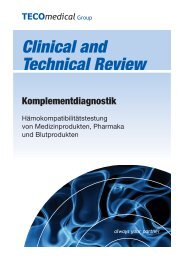
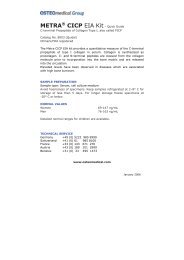
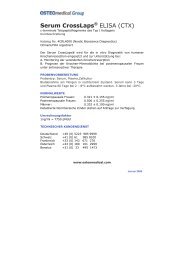
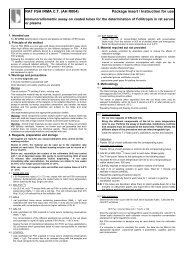
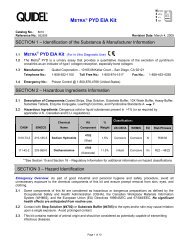

![PTH [Hormone Parathyroïdienne] Intacte ELISA](https://img.yumpu.com/1233682/1/190x245/pth-hormone-parathyroidienne-intacte-elisa.jpg?quality=85)
